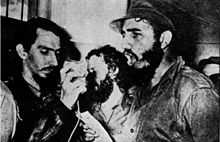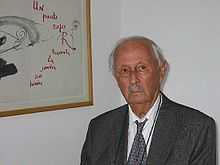Carlos Franqui
| Carlos Franqui | |
|---|---|
 Carlos Franqui in the middle with Fidel Castro making a speech to the right. | |
| Born |
December 4, 1921 Cuba |
| Died |
April 16, 2010 (aged 88) Puerto Rico |
| Organization | Radio Rebelde |
Political movement | Movimiento 26 de Julio |
Carlos Franqui (December 4, 1921 – April 16, 2010) was a Cuban writer, poet, journalist, art critic, and political activist. After the Fulgencio Batista coup in 1952, he became involved with the "Movimiento 26 de Julio" which was directed by Fidel Castro. Upon the success of the Cuban Revolution in 1959, he was placed in charge of Revolución, which became an official paper. After differences with the regime, he left Cuba with his family and in 1968 officially broke with the government when he signed a letter condemning the Soviet invasion of Czechoslovakia. He became a vocal critic of the Castro government, writing frequently until his death on April 16, 2010.
Early years
Born in a cane field, he was able to enter a vocational school, where he joined the Communist Party of Cuba. He gave up the opportunity to enter the University of Havana to become a professional organizer for the party at the age of 20. After successfully organizing the party in several small towns, he broke with the organization and became an unaffiliated leftist.
He turned to journalism to make a living, where his voracious reading provided him with a much better education than he would have received in the university. During this time Franqui became involved in several literary and artistic movements and developed friendships with Cuban artists, including writer Guillermo Cabrera Infante and painter Wifredo Lam.
Role in the Cuban revolution
Franqui broke ranks with the Cuban Communist Party in the late 1940s, but he remained an unaffiliated leftist.[1] After the Fulgencio Batista coup in 1952, he became involved with the "Movimiento 26 de Julio" which was directed by Fidel Castro. His contribution to the movement included co-editing the underground newspaper Revolución in Havana, for which he was in charge of public information. One article in particular reported the landing of the Granma and the confirmation of Fidel Castro's safety in the Sierra Maestra. He was jailed and tortured by the police. On his release, he went into exile in Mexico and Florida, but was soon drafted by Castro into the Sierra Maestra to continue work on Revolución, the guerrilla movement's clandestine newspaper and Radio Rebelde, their clandestine radio station.[2] See his book of published interviews, letters and personal thoughts in his "Diary of the Cuban Revolution". NY: The Viking Press, 1980.
Upon the success of the Cuban Revolution in 1959, he was placed in charge of Revolución, which became an official paper. During his tenure as editor, he maintained a degree of independence from the official line and emphasized the arts and literature, starting the literary supplement "Lunes de Revolución", which was directed by Guillermo Cabrera Infante and where high quality work by Cuban and international authors was featured. His position allowed him to travel extensively outside of Cuba.[3] During his European travels, he met artists and intellectuals, such as Pablo Picasso, Miró, Calder, Jean-Paul Sartre, Simone de Beauvoir, Julio Cortázar and many others. A significant number of these artists traveled to Cuba. One of the most memorable visits was that of Sartre and Simone de Beauvoir, which is recounted in the aforementioned book.
Due to his critical attitude, Franqui had frequent disagreements with the government, which eventually led to his resignation from "Revolución". The paper was closed a few months later. After his resignation, Franqui dedicated himself to art, organizing the famous "Salón de Mayo" exhibit in Havana (1967), where all leading artists in the world were represented.
Exile from Cuba

Because of his dissident attitude, he continued to have problems with the Cuban government. Eventually, he was allowed to leave Cuba with his family and settled in Italy as an unpaid cultural representative of Cuba. In 1968, he officially broke with the Cuban government when he signed a letter condemning the Soviet invasion of Czechoslovakia.
After his definitive exile, his literary production markedly increased. Franqui penned several major historical accounts of the Cuban Revolution, including, "El Libro de los Doce" (The Book about the Twelve) and "Diario de la Revolución Cubana" (The Diary of the Cuban Revolution). Yet, another facet of his literary opus were a number of poetry and graphic arts collections (for which he collaborated with Joan Miró, Antoni Tàpies, Alexander Calder, and others), several books of poetry, as well as several narrative works on art (some edited in Italian under pen names).
He continued to campaign against repression in Cuba and other countries. He was officially branded as a traitor by the Cuban government, which accused him of CIA ties. Also, many Cuban exiles shunned Franqui because of his active role in the Cuban revolution.[citation needed]
In the early 1990s he moved to Puerto Rico,[1] where he lived in semi-retirement. In 1996, he founded Carta de Cuba, a quarterly journal featuring high-quality work produced in Cuba by independent journalists and writers. Franqui continued to edit the publication until his death, which occurred on April 16, 2010 in Puerto Rico.[4]
Erased from Cuba

After breaking relations with Cuba the Cuban government began erasing Franqui's image from the country's revolutionary history. In the above image of Fidel making a broadcast Franqui was airbrushed out. Upon learning of his erasure Franqui had this to say:
| “ | I discover my photographic death. Do I exist? |
” |
— Carlos Franqui[5] |
References
- ↑ 1.0 1.1 Michel LE BAYON (2001). "CARLOS FRANQUI, the story of a revolution" (MOVIE). lieurac. Retrieved 2007-09-07.
- ↑ Don Moore (April 1993). "Revolution! Clandestine Radio and the Rise of Fidel Castro". Monitoring Times. Retrieved 2007-09-07. "The failure of the April rebellion convinced Castro that revolution could only be won on the battlefield, and that communications and propaganda were a bulwark of any military operation. Contacts in Miami arranged a secret airlift of more advanced radio equipment. Carlos Franqui, former editor of several underground newspapers, was brought in to head Radio Rebelde. More staff was recruited and programming expanded. Gradually Radio Rebelde became the center of a vast clandestine revolutionary broadcasting network."
- ↑ Carlos Franqui (1985). FAMILY PORTRAIT WITH FIDEL. Random House UK Ltd. ISBN 0-224-02268-7. – Page 65
- ↑ (Spanish) – Salas, Roger (April 17, 2010). "Carlos Franqui, writer and critic of Cuban art". ELPAIS.com. Retrieved April 17, 2010.
- ↑ Hany Farid (2007). "digital tampering". Retrieved 2007-09-07.
Written work
- Franqui, Carlos (June 18, 1980). Diary of the Cuban Revolution. Library of America. ISBN 0-670-27217-5.
- Franqui, Carlos (October 2006). Cuba, La Revolucion/ Cuba, the Revolution: Mito O Realidad/ Myth or Reality (El Ojo Infalible). Peninsular Publishing Company. ISBN 970-777-137-2.
- Franqui, Carlos (1984,1985). Family Portrait With Fidel: A Memoir. Random House, New York. ISBN ISBN 0-224-02268-7 ISBN 0394726200 Check
|isbn=value (help). - Franqui, Carlos| = Camilo, el Héroe Desaparecido, Planeta, 2001 (Spanish Edition), ISBN 0-9715256-3-3
- Franqui, Carlos | = Cuba, la revolucion/ Cuba, the Revolution: Mito o realidad. Memorias de un fantasma socialista, Peninsula, 2006. (Spanish Edition)| ISBN 84-8307-725-6
External links
|